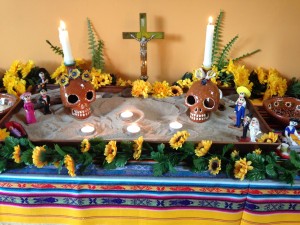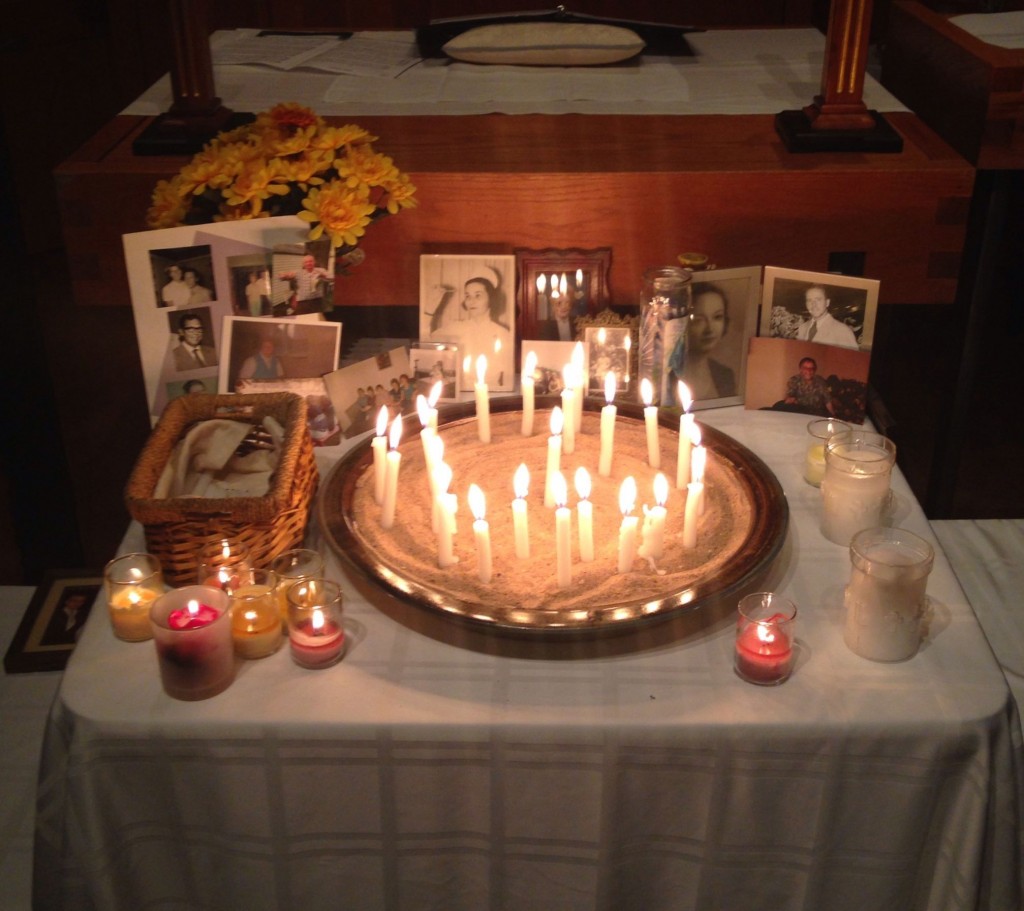by Linda McMillan
Some Sadducees, those who say there is no resurrection, came to Jesus and asked him a question “…there were seven brothers; the first married, and died childless; then the second and the third married her, and so in the same way all seven died childless. Finally the woman also died. In the resurrection, therefore, whose wife will the woman be? For the seven had married her.”
About 200 years before today’s readings in Luke, that old rascal Antiochus Epiphanes, started to think that all the Jews in the outlying territories should become more compliant about taking on Roman ways and he enforced his new rules with enthusiasm. There is a story that one day a woman and her seven sons were arrested and told to either eat pork or face a most cruel death. Since they followed the law of Yahweh, they refused to eat the pork and they were all tortured and died. They were not afraid, though, because they believed that they would live again.
The story continues to say that as her sons were being tortured, their mother encouraged them saying,
“I do not know how you appeared in my womb; it was not I who endowed you with life and breath. It is the creator of the world… who in his mercy will most surely give you back breath and life.”
One of her sons, while being skinned alive, said to his tormentors,
“You accursed fiend, you are depriving us of this present life, but the King of the world will raise us up to live again forever.”
Another son, noting that he didn’t have to die but was dying willingly, said,
“It is my choice to die at the hands of men with the hope God gives of being raised up by him.”
Maybe this resurrection-believing mother and her faithful sons were familiar with the prophet Daniel who had said that while Antiochus Epiphanes would be contemptible, the King of the universe would raise them up to new and everlasting life.
So, it was with this background of eight faithful Jews (the seven brothers and their mother), and the promise from Daniel, a promise that they did not believe, that the Sadducees approached Jesus with their question about seven more brothers. It is hard to know what the Sadducees really wanted from Jesus. What they did not want was an answer. They didn’t even believe in the resurrection, so it is not a question that would have concerned them. It is possible that they just wanted to embarrass those popular Pharisees. There was tension between the Pharisees and the Sadducees, you know. Whatever they actually wanted, they did not get it.
Jesus dismantled their question with a two-step maneuver and then moved in for the win with a quote from Torah: First he talked about angels, which the Sadducees also did not believe in, and then he said that in the resurrection we would be similar to angels. Then, for the win, Jesus used an example from the Saducee’s own holy book, saying that the God of Abraham, Isaac, and Jacob is the God of the living, not the dead. Therefore, Abraham, Isaac, and Jacob must be living… somehow, somewhere, they have to be alive.
It’s a devastating blow to those who say that this life is all there is. Jesus is saying that there is not life and death, there is just life as we know it now and life as we will know it later.
For us, and this is one of the things that we think about on All Saints Day, there is a veil between how we live now and how we will live later. Those who have already gone beyond the veil are said to be dead, but that is only language of convenience because we know that they are actually alive… somehow… somewhere. There is no death, only more life. And it seems likely that the life we will live after we die is not too different from the life we live now. After all, Jesus didn’t say, “Oh, they’ve gone to be in the cosmos,” or “Well, they’ve joined with the galactic stream of consciousness.” No. He talked about them as if they were still something of themselves. God, after all, is the God of Abraham, Isaac, and Jacob, not the God of an undifferentiated collection of souls.
 Some people think that on this day, All Saints, they may be able to contact those who have gone on to new life. It would be nice to be able to have a few more minutes with that one whom we’re missing so much. Some people might even visit the graveyard, the last place they saw the body of their loved one. But, the living are not in the graveyard.
Some people think that on this day, All Saints, they may be able to contact those who have gone on to new life. It would be nice to be able to have a few more minutes with that one whom we’re missing so much. Some people might even visit the graveyard, the last place they saw the body of their loved one. But, the living are not in the graveyard.
There is no basis for believing that the veil between one kind of life and another kind is thinner today, or thicker tomorrow. But, there is our consciousness about it. When we connect to the life of God that is in us, then we are also in communion with the life of God that is everywhere and part of all life. That might come through prayer or meditation. It might come from having pictures and thinking about those who are gone. It could be a memory, a story, a sound, a smell… it will be different for everyone. But, the connection — the communion of the saints — is real!
There are scriptural warnings about contacting the dead. It is even compared to child sacrifice! But, there is no prohibition on thinking about and believing in the real presence of those who are no longer experience life the way we do. That is, they no longer have a body.
As you dwell deeply with God today, remember that you are not alone. Those who have gone before us, the communion of all the saints, is very near. Hear the confidence of the martyrs as they willingly lay down their lives, allow yourself to be drawn into the wisdom and holiness of the saints, and know that everyone you’ve ever loved is near.
Linda McMillan lives in Shanghai.
Image: All Saints altar and Día de los Muertos altar at St. Catherine’s Episcopal Church, Nehalem OR
Some Notes of Possible Interest
Daniel 12:2… “The King of the universe will raise us up to an everlasting renewal of life. … One cannot but choose to die at the hands of men and to cherish the hope that God gives of being raised again by him”
The Sadducees did not accept the prophetic writings as scripture, they only believed and taught Torah, the first five books of the Hebrew Bible. (Christians sometimes refer to Torah as The Pentecauch.) But the Sadducees were not unaware. The Pharisees, after all, accepted more writings as canonical and the Sadducees would have known that, and were likely familiar with the prophetic writings.
2 Maccabees is considered an apocryphal writing. That means that it may be helpful, but it’s not part of the canon of scripture. You can read more about apocryphal texts here.
Regarding Pharisees and Sadducees… “Now the Pharisees love one another and practice consensus in their community. But the Sadducees behave rather aggressively even towards each other. And they are as harsh in debates among themselves as with others.” — Josephus, Jewish War 2.166. Also, there is a Rabbinic Lament over Sadducean Brutality in the Tosefta which is quite damning. (The Tosefta is a collection of teachings which did not make it into the Mishna.)
When Jesus said that we’d be similar to angels what he meant was that we would not get married or procreate. There is the added bonus in this that men will no longer be able to own women, something that at least the women can look forward to!
Deuteronomy 18… “When you come into the land that the Lord your God is giving you, you shall not learn to follow the abominable practices of those nations. There shall not be found among you anyone who burns his son or his daughter as an offering, anyone who practices divination or tells fortunes or interprets omens, or a sorcerer or a charmer or a medium or a necromancer or one who inquires of the dead, for whoever does these things is an abomination to the Lord.

